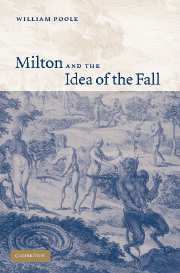Book contents
6 - The Fall in practice
Published online by Cambridge University Press: 10 December 2009
Summary
Hitherto, we have looked rather piecemeal at a variety of sources from gardening manuals to Church fathers. Now we turn to some more extended, mainly literary treatments of the story of the Fall of man – attempts to put theory into practice. It is when the spare, mysterious verses of the opening chapters of Genesis are scrutinised with a view to narrative extrapolation rather than doctrinal consistency that possible differences between these two sorts of coherency are revealed. Hence Jeremy Taylor points up the problem of the doctrinal commonplace by applying causal examination: ‘whether [Adam's nature] was not imperfect, and apt to fall into forbidden instances even before his fall, we may best guess at by the event’. Although Protestant exegesis had insisted on the literal truth of the Old Testament, even Augustine had stated that undoubtedly much had been left out of the Bible, lest prophecy descend to the level of mere history. But many then proceeded to imagine how such gaps could be filled.
Such ‘filling-in’, though, was not always a comfortable job, and often had to find a suitable rhetorical front for its operations. Thus the curious Sir Thomas Browne opened his Pseudodoxia epidemica (first edition 1646) with a promise to ‘pass over’ (in rhetorical terms occupatio, or praeteritio) a huge list of questions about Adam and Eve and their Fall – a promise he immediately and extensively broke.
- Type
- Chapter
- Information
- Milton and the Idea of the Fall , pp. 96 - 122Publisher: Cambridge University PressPrint publication year: 2005



